January 30, 2019 9:48 am
Published by Mikyron Padayachee
2018 saw the rise of virtual influencers. The subject of Virtual Influencers has rocked the influencer landscape leaving both marketers and influencers a bit confused. What is a virtual influencer? Are Virtual Influencers a fad or are they here to stay? How will Virtual Influencers affect me?
In 2018 the demand for influencer marketing increased significantly. The World Federation of Advertisers reported that 65% of marketers are looking to scale their use of influencers in the next 12 months. While the influencer industry has risen, so have the machines! With audiences in the millions, some virtual influencers have already collaborated with heavyweight brands like Prada and Gucci.
What is a virtual influencer?
A virtual influencer is a computer-generated avatar that uses artificial intelligence to operate on social media channels in the same way a human influencer would. Much like a human influencer, virtual influencers can gain popularity and collaborate with brands who want to use their influence to communicate the brand’s story with an audience. One of the most popular virtual Influencers is Lil Miquela, a “19 year old” computer generated model with over 1.5 million Instagram followers. Miquela has worked with fashion brands Prada and Channel. Another example of a virtual influencer is Shundu, the world’s first digital supermodel. Shundu collaborated with Rihanna’s Fenty Beauty lipstick. The collaboration went viral.
Human influencers come and go, however, IP lives forever
Human influencers have a ceiling to their potential. Virtual IP has almost unlimited potential. There are companies such as SuperPlastic, a designer toy company turned digital agency for virtual influencers, who are exploring possibilities of using AI and technology platforms to revolutionize entertainment and social media. They can do this by creating interactive games and using trends created by virtual influencer to influence a certain way of life.
The company behind virtual influencer Lil Miquela, Brud, is now worth at least $125 million after a new round of financing the company is currently closing. Investors are backing virtual influencer companies mainly because they are creating content that is free from the personalities and scandals that has defined a generation of social media stars.
Fad or are we living in an episode of Black Mirror?
For the foreseeable future, virtual influencers are not going anywhere. The success of virtual influencers like Lil Miquela and the incredible amount of venture capital that is being invested in virtual influencer companies means that we should all be prepared to see many more virtual influencers on our timelines. While virtual influencers may be fake, their audiences are real. According to managing director of Kantar, Gagan Bhalla, “What matters is not whether something exists or not, rather how creatively can a story be built around it – take Marvel or DC superheroes. They don’t exist, yet movies based on them are huge box-office grossers.”
What does this all mean for human influencers?
Human stories that are aspirational and inspirational will always be relevant. Brands will still want their stories to be associated with human stories that are in line with their identity and vision. After all, it is humans who will be buying their products. With this being said, more than ever, human influencers have a huge responsibility to uphold an appropriate image and follow FTC guidelines at all times while creating content that is engaging and authentic. As an influencer, you are now not only competing with other humans but also with technology.
Share this article
December 18, 2018 4:59 pm
Published by Mikyron Padayachee
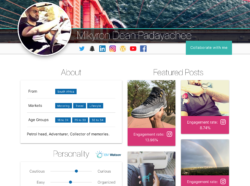
In the age of the Influencer, most influencers ignore the importance of a Media Kit. After all, everything a brand needs to know about your body of work is on your social channels, right?
What these influencers don’t realize is that Media Kits have a very specific focus and purpose beyond what your channel can convey. In essence, your Media Kit is a packet full of information about you as an influencer. Traditionally your Media Kit is sent to brands to encourage them to use your influence in a potential campaign, and also to brands you are currently working with.
Creating a Media Kit on Webfluential will give you access to unique and striking features. Brands will be able to view your body of work and information about you and your audience. Brands will also be able to begin a collaboration with you straight from your Media Kit.
Your Webfluential Media Kit updates in real time to reflect your changes in audience, as it grows, as well as your top performing content.
Here are some of the features that are shown on your Media Kit:
- Links to your channels and blog
- Your Audience’s demographic and geographic details
- The markets you operate in
- Your IBM Watson personality insights
- Featured posts
- Brands you have worked with
- A collaboration form for brands to fill in if they want to reach out to you
Sharing your Media Kit with brands and your audience can be a great tool for getting noticed and booking your next influencer campaign.
Take a look at some great media kits from influencers on Webfluential:
Candace Hampton
Candace is a Dallas based fashion, lifestyle, beauty and travel blogger with over 300,000 in following across social platforms.

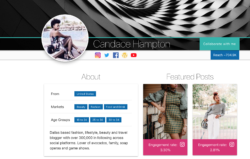
Christian Collins
Christian is an artist, entrepreneur, and social media influencer. His aim is to spread a positive message through his content.

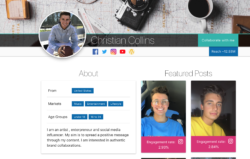
Karisma Collins
Karisma is a beauty, fashion and lifestyle influencer who loves to create positive inspiring content for people to watch and see.

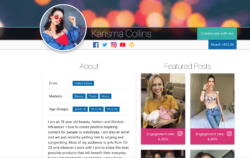
Many Of Many
Man of Many is one of Australia’s leading men’s lifestyle sites with over 500,000 unique visitors and 880,000 page views per month.

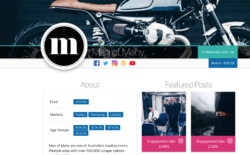
Nicola Marleen
For Nicola Fashion is so much more than buying clothes and being trendy. It’s about expressing herself to the outside world!

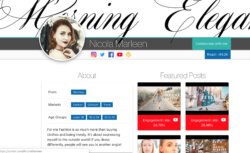
Josh Devine
Josh is a drummer for One Direction and ZFG.
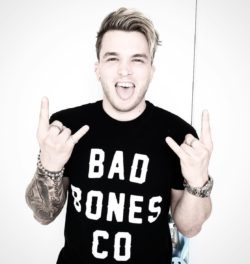
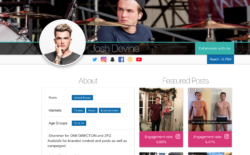
Thandolwethu Tsekiso
Thando blog’s about all things food, fashion, music, travel and lifestyle events.

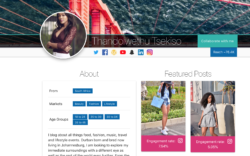
Cristina Petrini
Cristina is an Italian lifestyle, foodie and travel blogger with a unique perspective. She describes herself as a “witch blogger”.
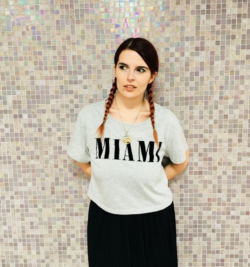
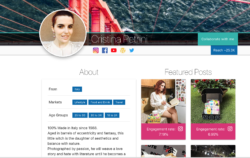
Melonie Graves
Melonie is a lifestyle influencer with a love of all things home decor, family, food, and wine.

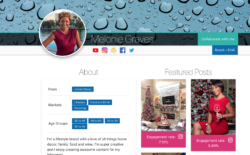
Sarah Funk
Sarah is a travel storyteller. She creates engaging, high-quality videos and photography that is shared on her channels.

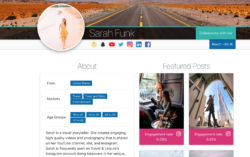
Share this article
October 1, 2018 12:31 pm
Published by Murray Legg
Have you ever bought something online that was so incredible, you just had to share it with your audience? Imagine if you could monetise your recommendations? Well, Webfluential has done just that. Now with the Webfluential Performance Marketplace, you can get a commission on your favourite ASOS item, suggested Emirates flight or online course from Coursera.
Social commerce – the premise that an audience buys goods and services because people they trust have illustrated the value and social proof of the goods and services through social media – is now a booming economy. As a result, Influencer Marketing is on the rise, with brands scurrying to source the right match of influencer to distribute their messaging to a hungry and trusting audience.

Webfluential has always championed the best interests of the influencer, and for those on the platform, provide value in other ways when campaign work is not available, such as AI driven personality insights, content insights and recommended brands for an influencer to pitch ideas to.
Today we’re launching the Webfluential Performance Marketplace – a way for our influencers to work with leading global brands and earn commissions on sales, on a constant basis – and thus take a step towards true financial independence as a full-time creator.
We’ve teamed up with over 20,000 brands that sell goods and services online so that Webfluential influencers will be able to share a unique link for each merchant that can be posted on their channels and included in their articles. When sales are rung up, the influencer earns a sales commision, in cases of up to 50% of the value of the sale. This is as easy as installing the Google Chrome extension and linking it to the creator’s Webfluential account.
“We’re very excited about merging the influencer marketing and performance marketing worlds together for our influencers. We believe that creators will become an increasing part of the story that brands tell, so by opening up our network of influencers now reaching over 1.3bn people globally, merchants can expect a lift in sales,” says Murray Legg, co-founder of Webfluential.
As an example, influencers can write an article about taking a holiday to their favourite destination, booking the travel on Emirates, the accommodation on Booking.com and the photography equipment on BestBuy. Each of those merchants offer influencers a commission when sales are booked through their performance links.
For influencers on Webfluential, they can start today by logging into their account and activating their Performance account. For those not on Webfluential, they can sign up here.
Share this article
























